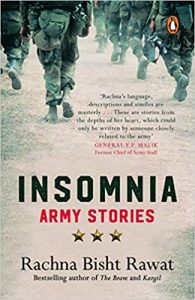Saurabh Tankha
It was probably in the latter half of 2000 that I remember reading a funny true stories’ compilation – Reader’s Digest Humour In Uniform – about life in the military from all over the world. These contributions were in the form of jokes, cartoons, quotes, anecdotes and stories of men and women from the armed forces or their family members. In fact, the almost 100-year-old magazine (it was founded in 1922), Reader’s Digest carried a monthly column too in its pages.
Cut to 2020. When I got hold of a copy of, Insomnia Army Stories (Penguin Random House India, Rs 299, 528pp), the memories of the bygone era came flooding back. A collection of interesting stories about men in armed forces, Insomnia is author RACHNA BISHT RAWAT’s latest release. Rachna had earlier penned four bestselling books on the Indian Army – 1965: Stories from the Second Indo-Pakistan War; Shoot. Dive. Fly.: Stories of Grit and Adventure from the Indian Army; The Brave: Param Vir Chakra Stories and Kargil: Untold Stories from the War.
Excerpts from an interview:
Why call this collection of stories – Insomnia?
For me, Insomnia is the defining story of the book. It was a story I wrote 10 years back that tries to look inside the mind of a soldier who has been guilty of an episode of human right violations that haunts him for his lifetime. The aim behind the story was to explore the psyche of a soldier forced to serve in Kashmir, the trauma of that tenure and its repercussion; something that we overlook when we hear of episodes in places like Kashmir. I would like to clarify that the story does not justify human right violations in any way or absolve the guilty. It just tries to examine how the trauma is sometimes faced both by the violator and the violated.
How did you select the stories?
I picked stories that made characters in uniform sound human. They are not the glorified heroes we make them out to be but also ordinary people like us with the same sensibilities that we all possess.

I have met young reckless 20-plus-year-old officers, straight out of college with a song on their lips, a girl in their hearts and a prank in their heads. But when it comes to risking their lives for their country, they step forward and embrace that responsibility with the same abandon
Which one is your favourite and why?
I loved writing about the escapades of the young Army Major who along with his band of kickass soldiers goes around Kashmir, Siachen and Agra, moving from one (mis)adventure to another. I have met officers like that in the Army, who are young reckless 20-plus-year-olds, straight out of college with a song on their lips, a girl in their hearts and a prank in their heads. But when it comes to risking their lives for their country, they step forward and embrace that responsibility with the same abandon.
Ever thought of penning a book not related to the Defence Forces?
Yes, I have. Hopefully, my editor at Penguin Random House will find it interesting enough.
What made you say – I’m an Indian writer who has spent more than two decades putting words together for a queer mix of people: temperamental editors; tricky publishers; confused magazine heads; pony tailed weirdos; but above all, myself?
I write and have written for a lot of people but the bottom-line is that I write for myself. Writing completes my life in so many ways. I used to write blogs even when there was no one reading them.
Writing completes my life in so many ways. I used to write blogs even when there was no one reading them. I write and have written for a lot of people but the bottom-line is that I write for myself
What is Rachna Bisht Rawat doing when she is not breathing Indian Army and life around it?
Reading, attending Indian classical music classes, taking Hukum (my pet dog) for a walk, going to a pub with Manoj Rawat (husband) or just making silly birthday videos for her classmates most of who are turning 50 this year.
An author who inspired you to write.
I think Ruskin Bond.
In your opinion, what is that one thing which is the most important part of a book?
Same as what I think is the most important part of a person. Sincerity and intelligence. And, of course, how much it can hold my attention amidst other distractions.
What does it take to be a good storyteller?
I think you should have the sensitivity to observe and feel things and emotions; and the ability (command over the skill of writing or telling) to convert it into words or film or whatever form you plan to use to tell that story..
The word “creative” to you is…
A lot of fun. To indulge in as well as to observe.
Fiction or non-fiction.
Fiction. It is born in your mind and hence so much more challenging and creatively satisfying.
Favourite childhood book.
Aah! So many.
Favourite childhood author.
Enid Blyton and then PG Wodehouse.
Favourite book now.
So many again. To Kill A Mocking Bird is a great book. I also love authors who bring their own cultures and regional sensibilities into their stories. Like Gabriel Garcia Marques, Murakami, Jhumpa Lahiri. I find those narratives very fascinating. I also find a sense of humour very attractive; in books as well as people.
You are, at present, reading.
Two books. City of Djinns by William Dalrymple and The Transformation of Man by J Krishnamurthy, abridged from his video recordings.